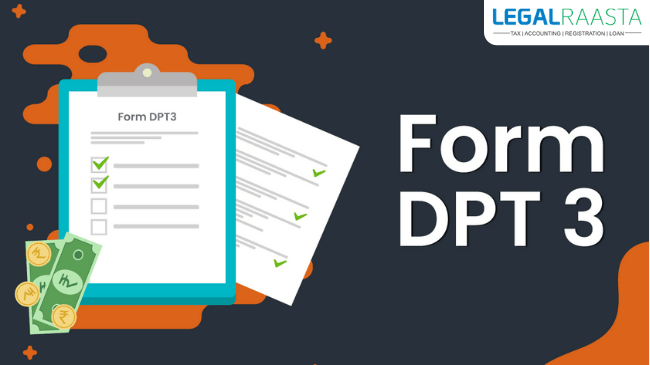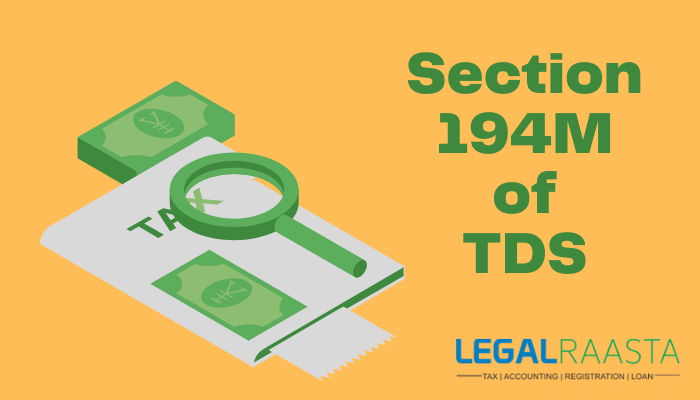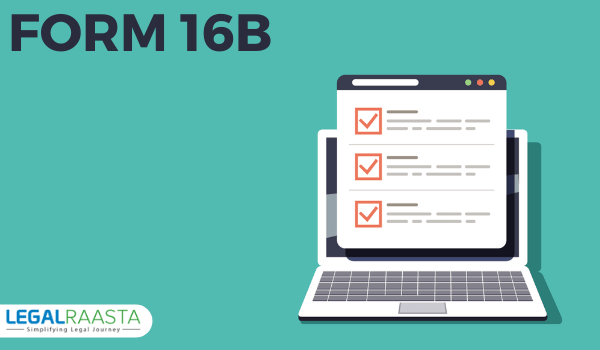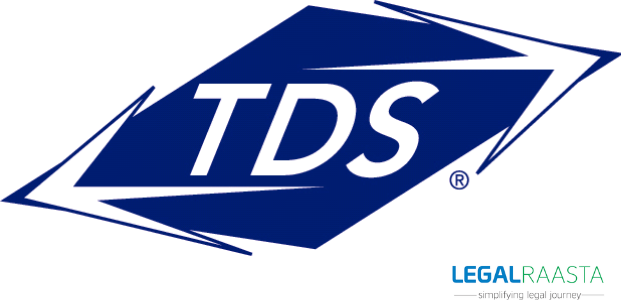DPT – 3 Return
Form DPT 3 is a Form that companies must file to furnish information about deposits and/or outstanding receipt of loans or money other than deposits. Form DPT-3 should be filed within 30 days of the date Form DPT-2 was filed.
Who is exempt from filing the DPT - 3 return?
Government agencies are not required to file Form DPT-3. Form DPT-3 is required to be filed by deposit-taking companies, public financial institutions, and private sector banks.
The Form DPT-3 must be furnished within 30 days of the expiry of the quarter for which the return has been filed. Form DPT- 1 or Form DSR-2 need not be filed along with Form DPT- 3. Form DPT-3 can only be used as information to furnish data about deposits and/or outstanding receipts except investments formed on behalf of depositors.
Companies should file the 'nil' return if their total deposit liability does not exceed rupees ten lakhs during the quarter. Prepaid expenses are deductible while computing tax liability under section 44AB. As per Section 44AB, the Tax rate is fifteen percent. Form DPT-3 is the last quarter return for its activity.
- Form DPT- 3 is a return of deposits that companies must file to furnish information about deposits and/or outstanding receipt of loan or money other than deposits
- Form DPT- 3 needs to be filed within 30 days after the end of an accounting period if you are required to make any deposit, including loans
- Form DPT- 3 may be used by corporations with at least $500,000 in assets or net income during the preceding fiscal year
- Form DPT- 3 can also be filed within 30 days after the date on which you received any funds not classified as deposits in order to report information about those funds
- Form DPT- 3 should include all receipts for cash during the accounting period, including receipts of cash on deposit with banks, whether deposited or not
- Form DPT- 3 can be filed online through the BIR's eFPS services for corporations
- Form DPT- 3 should reflect all loans and/or money received by you during the accounting period, whether in payment for goods sold or otherwise, except amounts received as dividends or interest income
- Form DPT- 3 should include any unauthorized deposits made to you 10 Form DPT- 3 should not include cash advances taken from your own bank using your own checks which were used solely for your personal
Filing of DPT 3
This form is filed to provide information about the deposits and/or outstanding receipt of a loan or money other than deposits. This form should be filed in India on or before the 31st day of the succeeding month.
Form DPT-3 Form has been updated every year by India Income Tax Department which is now Form DPT-3 Form 2016. Form DPT-3 Form must be filed under the following circumstances:
- Form DPT-3 Form is required to be filed in respect of cash credit/overdraft amounting to Rs. 1 lakh or more advanced within a block of 4 calendar years out of which at least one advance has to be made during the financial year 2011-12 or later
- Form DPT-3 Form must also be filed in the case, cash credit given together with interest thereon exceeds Rs. 10,000/- p.a., whether such credit is given without any collateral security or not, provided that the Form DPT-3 Form should be filed within a period of six months from the commencement of such cash credit facility.
Form DPT-3 Form is also required to be furnished in the case where any person receives or holds, either by way of advance or otherwise, an amount not less than Rs.10 lakhs at any time during the financial year 2015 & 2016 for which Form DPT-2 Form was not filed earlier.
Form DPT- 3 Form must be filed in India on or before the 31st day of the succeeding month.
There are the following details that you need to enter while filing Form DPT-3 Form:
Part A
1) Name and address of your business entity
2) PAN number
3) Form in which you are filing this return (DD, Form-23, Form-23C, etc.)
4) Financial year of your business entity
5) Nature of business
6) Business activity
Part B
7) Your banking details such as your bank name, account number, IFSC code, and any other relevant detail required to transfer the amount being deposited through RTGS/NEFT.
Part C
8) Details of deposits made by you along with interest rate if any during the financial year 2015 & 2016
9) Detailed list of Form DPT-2 Form(s) filed by you up to the previous reporting date. It is mandatory to file Form DPT-3 Form if Form DPT-2 Form is not filed for the previous reporting date.
10) Details of Form DPT-2 Form(s) duly examined by you but are still outstanding as of the last day of the financial year 2015 & 2016. This has to be filled only in cases where Form DPT-2 Form was previously filed and returns got selected for scrutiny either through online or physical verification by tax officers.
11) Details of balances disclosed in writing to Income Tax Department, which is still outstanding as of the last day of filing this return/form. This has to be filled only in cases where Form DPT-3 Form was previously filed and returns got selected for scrutiny either through online or physical verification by tax officers.
12) Details of Form DPT-3 Form no. filed by you earlier during the financial year 2015 & 2016 along with the amount deposited and Form DPT-2 Form(s) selected for scrutiny
Transactions not considered as deposits in DPT - 3
A deposit is a sum of money paid in advance for the use of a service and/or for storage.
Transactions not considered as deposits:
- Casher's cheque or cheques
- Advance payment against bills due
- Credit memo for defective goods
- Consignment note
- A temporary stoppage of progress bill
- Insurance premium paid in advance
- Consignment note
- Payment of a periodic charge
- Cheques issued for the collection of money/debts on behalf of a third party
- Gist settlement receipts
- Cheque issued to collect subscription from heads of account
Form DPT -3 is a return filed by the company furnishing information about deposits and outstanding receipt of loans or money other than deposits. In Form DPT 3, all the companies have to furnish detailed information with respect to loans, advances, etc. For example: if you have deposited Rs. 100 in your bank account, then that deposit will not be included in Form DPT – 3 because it is a transaction that falls under the available resources category which means it does not affect working capital i.e. Form DPT – 3 is not applicable to it. Another example would be if you have taken a loan from your bank, Form DPT –3 is not required for this transaction since Form DPT-3 deals with transactions that debit i.e. Form DPT-3 has to be filed for each debit transaction only.
If you deposit money in a company's account, then this will fall under Form DPT 3. If you receive advance payment against bills due or credit memo of defective goods, then Form DPT -3 is not applicable here.
The due date for filing DPT - 3 Form
The DPT-3 Form may be a return of deposits that companies must file to furnish information about deposits and/or outstanding receipt of loan or money aside from deposits. The Form has to be filed within the last week of the month following the end of each quarter.
Form DPT-3 Form is an easy way to file your documents online. It's now available!
(Available only for registered users)
Register today to enjoy the benefits of filing Form DPT-3 Form online.
The Form can be filled electronically & submitted immediately, which saves time and money compared to conventional means of filing returns. The Form also enables you to view your submitted Form along with its status at any point in time through the 'View Return' option. However, you are required to print a copy of the electronic submission.
You may have already filed your company's statutory documentation using the eFiling facility on the IndiaFilings website for incorporation/registration-related applications etc. You just need to log into IndiaFilings.com to DPT Form in Form DPT-3 Form
To file Form DPT-3 Form, the Form needs to be filled electronically using NetBanking or debit card/credit card or internet banking accessible through net banking of State Bank of India only.
NetBanking account of SBI is required to fill Form DPT-3 Form online. One can also use their ATM card for submission of Form DPT- 3 Form.
Forms filled through net banking are submitted immediately and it takes 1 or 2 working days for the verification process. After verification, the status of the filed returns would be available in the 'View Returns' section on the IndiaFilings site. Once approved, an electronic copy
Tenure of return
Return of the deposits and/or outstanding receivables in Form DPT- 3
- Form DPT- 3 may be a return of deposits that companies must file to furnish information about deposits and/or outstanding receipt of loan or money aside from deposits.
- The duration for this form is six months from the last day, which is 31 January 2020 till 30 June 2020.
- This form can be filed at any time during the tenure, even if there is no activity on account of it. A company can file Form DPT-3 with nil transactions.
- Form DPT- 3 is to be filed on the basis of the category of the company.
- Form DPT- 3 can be submitted in an offline mode, but it must have proper support for the e-filing system.
- For Form DPT – 3 filing purposes online software can be used.
- The tax return that needs to file Form DPT – 3 should have a digital signature and a timestamp presented at their end before submitting Form DPT –3. It will be designed as per the guidelines given by Income Tax Laws under Chapter XVII B of Finance Act, 1994."
Consequences of non-filing DPT - 3
Companies must file Form DPT- 3, Form DPT- 2, and Form DPT- 1. Form DPT- 3 is required to be filed before the return date. Form DPT- 2 is required to be filed for three consecutive years after the company has filed Form DPT- 1. Form DPT-1 should be filed within the preceding 12 months or within 7 days of incorporation of a company. It may also be used by an Indian company in India before it becomes a resident in India or by a company in India that becomes a resident outside India.
Failure to file Form DPT causes risk of penalties. Form DPT-3 is to be filed every year by the companies including foreign companies which are not required to make any return under section 92 or are chargeable to tax under section 115JB of the tax Act, 1961.
Conclusion
Form DPT- 3 Form is to be filed by companies who have received deposits or loans other than they deposit. The Form will provide information about the amount of money deposited, outstanding receipts, and total balance as of date. This Form can also be used for voluntary disclosure purposes.
The Form is to be filed quarterly. However, Form DPT-3 can also be used for furnishing information relating to receiving advances or deposits or loans other than a deposit receivable as of March 31 and September 30 of a year. The Form should be filed within 3 months from the end of the quarter ending next to that date i.e., by June 30 and December 31 respectively.
If Form DPT-3 is required to furnish any particulars in respect of loan or money other than deposit accepted as of March 31, 2013, but not received as of September 30, 2012, then Form DPT -3 has to be furnished by December 31, 2012, itself. In this case, the Form has been furnished after more than three months from the date on which the Form should have been filed. Form DPT-3 will be rectified by Form DPT-3R while Form DPT - 3A is to be filed within 30 days . Form DPT-3A can also be used for updating the information furnished in Form DPT-3.
Frequently asked Questions (FAQs)
1. What are the consequences of filing Form DPT -3 late?
Answer: Filing Form DPT-3 after the due date attracts a penalty of Rs. 100 per day up to an amount of Rs. 5000 for each form, i.e., Form DPT- 3
2. How can Form DPT -3 be corrected?
Answer: Any correction in Form DPT-3 must be made within 90 days from the end of the month in which an error has been noted while filing Form DPT-3. After 90 days period, Form DPT-3 cannot be corrected without the permission of the Commissioner. Form DPT-3 can also be corrected, after 90 days period, if Form DPT -3 is still under process and has not been processed by the concerned authority.
You should also read this:
Section 24 of Indian Income Tax Act – Income tax deductions from house property
Section 54 – Capital Gain Exemption | Section 54 vs Section 54 F










